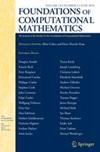A New Approach to Handle Curved Meshes in the Hybrid High-Order Method
IF 2.5
1区 数学
Q2 COMPUTER SCIENCE, THEORY & METHODS
引用次数: 0
Abstract
Abstract We present here a novel approach to handling curved meshes in polytopal methods within the framework of hybrid high-order methods. The hybrid high-order method is a modern numerical scheme for the approximation of elliptic PDEs. An extension to curved meshes allows for the strong enforcement of boundary conditions on curved domains and for the capture of curved geometries that appear internally in the domain e.g. discontinuities in a diffusion coefficient. The method makes use of non-polynomial functions on the curved faces and does not require any mappings between reference elements/faces. Such an approach does not require the faces to be polynomial and has a strict upper bound on the number of degrees of freedom on a curved face for a given polynomial degree. Moreover, this approach of enriching the space of unknowns on the curved faces with non-polynomial functions should extend naturally to other polytopal methods. We show the method to be stable and consistent on curved meshes and derive optimal error estimates in $$L^2$$

一种高阶混合曲面网格处理新方法
在混合高阶方法的框架下,提出了一种处理曲面网格的新方法。混合高阶方法是求解椭圆偏微分方程的一种现代数值格式。对弯曲网格的扩展允许在弯曲域上强制执行边界条件,并允许捕获在域内部出现的弯曲几何形状,例如扩散系数中的不连续。该方法利用曲面上的非多项式函数,不需要参考元素/面之间的任何映射。这种方法不要求曲面必须是多项式,并且对于给定的多项式度,曲面上的自由度个数有严格的上界。此外,这种用非多项式函数丰富曲面上的未知空间的方法应该自然地扩展到其他多边形方法。我们证明了该方法在弯曲网格上是稳定和一致的,并在$$L^2$$ l2和能量范数中得到了最优误差估计。给出了该方法在具有弯曲边界的区域和扩散张量沿弯曲弧线不连续的扩散问题上的数值例子。
本文章由计算机程序翻译,如有差异,请以英文原文为准。
求助全文
约1分钟内获得全文
求助全文
来源期刊

Foundations of Computational Mathematics
数学-计算机:理论方法
CiteScore
6.90
自引率
3.30%
发文量
46
审稿时长
>12 weeks
期刊介绍:
Foundations of Computational Mathematics (FoCM) will publish research and survey papers of the highest quality which further the understanding of the connections between mathematics and computation. The journal aims to promote the exploration of all fundamental issues underlying the creative tension among mathematics, computer science and application areas unencumbered by any external criteria such as the pressure for applications. The journal will thus serve an increasingly important and applicable area of mathematics. The journal hopes to further the understanding of the deep relationships between mathematical theory: analysis, topology, geometry and algebra, and the computational processes as they are evolving in tandem with the modern computer.
With its distinguished editorial board selecting papers of the highest quality and interest from the international community, FoCM hopes to influence both mathematics and computation. Relevance to applications will not constitute a requirement for the publication of articles.
The journal does not accept code for review however authors who have code/data related to the submission should include a weblink to the repository where the data/code is stored.
 求助内容:
求助内容: 应助结果提醒方式:
应助结果提醒方式:


